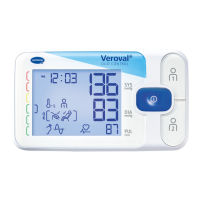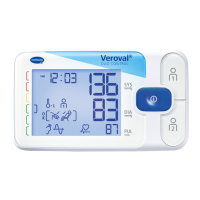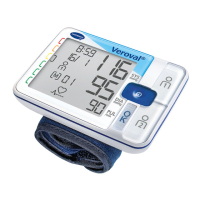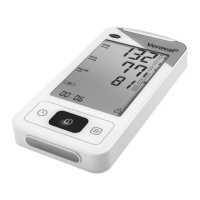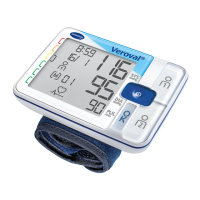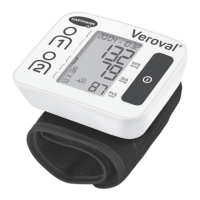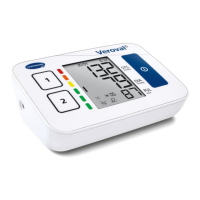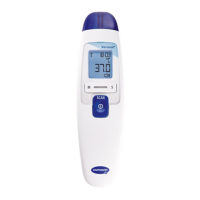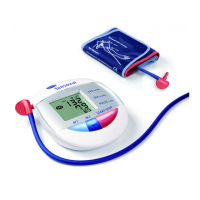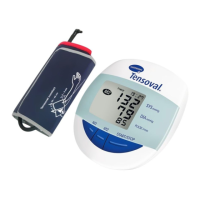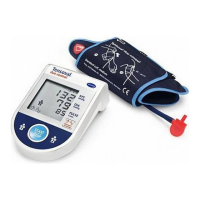10 11
An irregular heartbeat is present when the heart rhythm deviates by
more than 25% from the median heart rhythm. The contraction of the
heart muscle is stimulated by electrical signals. Adisorder of these
electrical signals is called an arrhythmia. This may be due to a genetic
predisposition, stress, age, lack of sleep, exhaustion or similar factors. A
doctor can establish whether an irregular heartbeat is the result of an
arrhythmia.
Heart rhythm disorders are disturbances of the normal rate or rhythm of the
heartbeat. A distinction should be made between mild and severe heart rhythm
disorders. This can only be determined by a special examination carried out by a
doctor.
Power supply (batteries)
• Observe the polarity labels plus (+) and minus (-).
• Only use high-quality batteries (see specication in Chapter 12 ‘Technical data’). If
you use low-quality batteries, we can no longer guarantee the specied number of
measurements.
• Never mix old and new batteries or batteries from dierent manufacturers.
• Remove at batteries immediately.
Safety information concerning the device
• This blood pressure monitor is not waterproof.
• This blood pressure monitor is made of high-quality electronic precision
components. The accuracy of the measured values and the lifetime of the device
depend on careful handling.
• Protect the device from violent shaking, hitting or vibrations and do not let it drop
on the ground.
• Do not bend or fold the cu excessively.
• Never open the device. The device must not be modied or dismantled, and must
not be repaired by the user. Repairs may only be carried out by an authorised
specialist.
• Do not inate the cu when it is not properly applied to the wrist.
• Do not expose the the device to extreme temperatures, humidity, dust or direct
sunlight as this may cause it to malfunction.
• Keep the packaging, batteries and the device out of reach of children.
• Protect the device and cu against contact with pets and pests in order to avoid
damage.
• Please comply with the storage and operating conditions dened in Chapter12
‘Technical data’. Storing or using the device outside of the specied temperature
and humidity range can aect measurement accuracy or the function of the device.
• If the device was not stored within the minimum/maximum permissible storage
conditions, a waiting period of at least 2 hours must be observed before using
it under the specied operating conditions (Chapter 12 ‘Technical data’) or an
ambient temperature of approx. 20 °C.
• Do not use the device in explosive environments with inammable gases or
concentrated oxygen.
Instructions regarding electromagnetic compatibility
• The device is suitable for use in all environments listed in these instructions for use,
including domestic environments.
• It may only be possible to use the device to a limited extent in the presence of
electromagnetic disturbances. This could result in issues such as error messages or
the failure of the display/device.
• Avoid using this device directly next to other devices or stacked on top of other
devices, as this could lead to faulty operation. However, if it is necessary to use the
device in the manner described above, this device and the other devices must be
monitored to ensure that they are working properly.
• The use of accessories other than those specied or provided by the manufacturer of
this device may result in increased electromagnetic emissions or a decrease in the
device‘s electromagnetic immunity and lead to faulty operation.
• Replace batteries if the battery symbol remains illuminated.
• Always replace all the batteries at the same time.
• If you do not intend to use the monitor for a longer period of time, you should
remove the batteries to prevent possible leakage.
Information about batteries
•
Choking hazard
Small children could swallow batteries and suocate on them. Keep the
packaging, batteries and the monitor out of the reach of children.
•
Risk of explosion
Do not throw batteries into a re.
• Batteries must not be charged or short-circuited.
• If a battery has leaked, wear protective gloves and clean the battery
compartment
with a dry cloth. If liquid from a battery cell comes into contact
with skin or eyes, clean the aected area with water and seek medical
attention if necessary.
• Protect batteries from excessive heat.
• Do not disassemble, open or crush batteries.
IFU_9252050_020323.indd 10-11IFU_9252050_020323.indd 10-11 02.03.23 10:4202.03.23 10:42
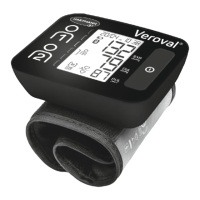
